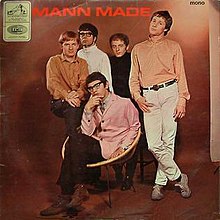| Mann Made | ||||
|---|---|---|---|---|
 | ||||
| Studio album by | ||||
| Released | 8 October 1965 (UK) 5 November 1965 (US) 6 June 1966 (Canada) | |||
| Recorded | 11 January – 10 June 1965 | |||
| Studio | Abbey Road Studios, London | |||
| Genre | ||||
| Language | English | |||
| Label | His Master's Voice (UK) Ascot (US) Capitol (Canada) | |||
| Producer | John Burgess | |||
| Manfred Mann chronology | ||||
| ||||
| Manfred Mann album chronology | ||||
| ||||
| Review scores | |
|---|---|
| Source | Rating |
| Record Mirror | |
| Uncut | |
Mann Made is the second British and fourth American studio album by Manfred Mann, released in October 1965 on His Master's Voice in the United Kingdom, [3] and November 1965 on Ascot Records in the United States. [4] It was the group's final recording project with original members Mike Vickers and Paul Jones, as well as their last to be recorded at Abbey Road Studios, London, England, before switching to Fontana Records.
Contents
- Track listing
- Original UK/US release
- Original Canadian release
- Recording sessions
- Personnel
- Release history
- References
- See also
The album was reduced to twelve songs by Capitol Records in the Canadian market, where "You're for Me", "I Really Do Believe", and "Hi Lili, Hi Lo" were excluded, and replaced by "She Needs Company" along with the hit single "Pretty Flamingo" for the June 1966 release. [5]